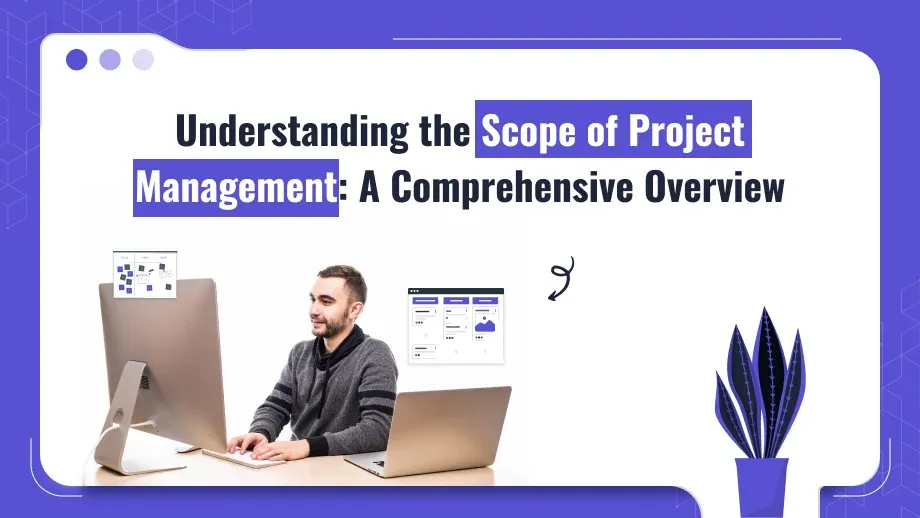The scope of project management defines all the work required to deliver a project successfully, including tasks, deliverables, objectives, and exclusions. It helps align team efforts with project goals and prevents misunderstandings.
Grab a chance to avail 6 Months of Performance Module for FREE
Book a free demo session & learn more about it!
-
Will customized solution for your needs
-
Empowering users with user-friendly features
-
Driving success across diverse industries, everywhere.
Grab a chance to avail 6 Months of Performance Module for FREE
Book a free demo session & learn more about it!
Superworks
Modern HR Workplace
Your Partner in the entire Employee Life Cycle
From recruitment to retirement manage every stage of employee lifecycle with ease.


Seamless onboarding & offboarding
Automated compliance & payroll
Track performance & engagement
Understanding the Scope of Project Management: A Comprehensive Overview
- Superworks
- 11 min read
- October 11, 2024

Project scope management is one of the major issues concerning project success in a dynamic business environment of today. It involves the job of producing a product, service, or result that may have specific features and functions. Definitely it’s the most important task if we talk about project managers at the workplace or you are managing freelance projects. All are similar but everything should be delivered on time.
This blog will talk about the scope of project management, define its various elements, processes under a scope management plan, issues faced by project managers, and the best practices that lead to achieving successful results in a project.
- What is the Scope of Project Management?
- Importance of Defining the Scope of Project Management
- Elements of Project Management Scope
- Scope Management Process
- Challenges in the Management Scope of Project Management
- Effective Scope Management Best Practices
- The Scope of Project Management in India
- Conclusion
What is the Scope of Project Management?
The scope of project management refers to the limits or boundaries of a project. All tasks, deliverables, and objectives that need to be accomplished to achieve the goals of the project are considered within it. Defining the project scope becomes very important as it is crucial for various reasons: it helps team effort get aligned with the organizational objective and the expectations of the stakeholders.
Major Components of Project Scope
The most prominent components that form the scope of project management are:
- Project Deliverables: Concrete results or products that the project will produce. Deliverables might include real goods like products or intangibles like reports or services.
- Project Objectives: Means by which the projects can be accomplished and usually include associations with the general organizational objectives. SMART is for Specific, Measurable, Achievable, Relevant, and Time-bound, and this is what goals should be.
- Requirements: Features and functionalities the deliverables must meet. Normally, in requirements documents, they are explicitly stated and can be agreed upon by the stakeholders.
- Exclusions: This is everything that falls within the scope of the project, that should not be included within the scope. This prevents scope creep. Clearly stating what should not be included within the scope prevents misunderstandings along the course of the project.
- All parties involved, including the Project Business Analyst, will be aware of its contents and direction from the beginning of the project thanks to a well defined scope.
Importance of Defining the Scope of Project Management
Getting the scope of project management is crucial for a number of reasons:
Clarity and Focus
A clear-cut project scope is well-defined specifications of the project, giving clarity and focus on the entire team. The project scope meaning helps one understand roles and responsibilities that way efforts are aligned towards common goals. Reducing confusion and misunderstandings that can stop the project dead in its tracks, thus becoming quite important for freelancers in management.
When working with several customers, a Freelance Project Manager must set clear limits in order to complete duties effectively and on time. This makes it particularly crucial in this situation.
Prevention of Scope Creep
Scope creep represents uncontrolled expansion of scope with no proportional adjustments to time, cost, or resources. In project management, the clear definition of scope in project management, by setting clear boundaries and expectations. Changes can be assessed against scope in place, to know its implication.
Resource Management
Scope of a project Thus, project managers can better resource while managing the scope. It makes it easier to define what is and is not within a project’s scope, which helps decide the physical, financial, and human resources required to meet the goals.
Defining the scope is even more important in large organizations or in the management of a Project Portfolio. Managing concurrent resources for multiple projects may lead to over-allocation or resource conflicts; thus, proper definition is more important.
Risk Management
A well-defined scope helps identify the risks that may be faced in a project. The inclusions and exclusion outline challenges that can be envisaged by project managers and allow them to work out a course of action to overcome it.
Stakeholder Alignment
A well-defined project scope will assure that stakeholder expectations are aligned with the project objectives. When all stakeholders understand the scope of the project, then there would be a reduction in conflicts, and people get to work towards the same objectives.
Elements of Project Management Scope
To appropriately manage project management scope, the following are elements that must be considered by the project manager:
1. Scope Statement
The scope statement represents a critical document in defining the objectives, deliverables, and requirements for the project undertaken. It acts as a reference point throughout the project lifecycle in which decisions can be referred to and aligned accordingly amongst various stakeholders.
A good scope statement embodies:
- A description of the project and its goals.
- Deliverables to be produced and their acceptance criteria.
- Overview of project constraints and assumptions
- Dependencies on other projects or initiatives
2. Work Breakdown Structure.
The project scope is hierarchically broken down into smaller, easier-to-manage components using a Work Breakdown Structure (WBS). This will make planning, carrying out, and monitoring easier by assisting the project manager in decomposing the necessary work into discrete tasks.
The WBS generally includes
- Major deliverables of the project.
- Sub-deliverables that constitute the main deliverables.
- Tasks involved in the requirement of completion of each sub-deliverable.
A WBS enables the visualization of a project scope graphically and, therefore, enables teams to conceptualize how things relate to each other in scope.
3. Scope Management Plan
A scope management plan outlines and confirms how the project’s scope will be established, managed, and verified. Procedures for modifying the project’s scope would be described, along with rules for handling scope-related concerns.
It usually contains the following in a scope management plan:
- Processes of collecting requirements for and defining the scope.
- Procedures for obtaining approval to alter the project’s scope.
- Procedures for monitoring project performance against its scope.
Scope Management Process
The scope of managing projects involves the most crucial processes, including the following:
Scope Planning
This is the phase in the project scope management plan where the project scope is defined. A scope management plan is developed through requirements gathering from stakeholders, interviews, and even surveys and workshops to have a clear understanding of what is expected in terms of project objectives to be achieved.
Scope Definition
This stage includes the development of a detailed scope statement. It is what gives the project objectives, deliverables, and requirements. Then, the WBS will break the project down into workable parts, so to speak.
Scope Validation
Scope validation occurs when there is formal acceptance of the deliverables of the project from stakeholders. This simply means that what has been produced meets the agreed-upon requirements and quality standards.
Scope Control
Scope control is the process of monitoring and managing changes in the project scope throughout the life of the project. A project manager will have to track the actual project’s progression in comparison to the scope that has been defined, and any deviations or change orders must be addressed to keep the project on track.
Maximize Your Projects – Master the Scope of Project Management!
Define scope, objectives, and deliverables to ensure project success from the start.
Scope Verification
Scope verification checks to confirm whether the project deliverables meet the specified requirements. It is a quality assurance stage because it checks whether the project deliverables meet the expectation of the stakeholder.
Challenges in the Management Scope of Project Management
While management of the scope of project management is integral, it is not without its challenges. Among the most common issues a project manager may face are stakeholder expectations.
Stakeholder Expectations
Different requirements and priorities may come from various stakeholders, and managing diverse stakeholder expectations can be challenging. It thus requires effective communication and negotiation skills to position expectations and avoid misunderstandings.
Scope Creep
One of the common challenges in project management is scope creep. A weak definition of clear scope with inadequate change control processes results in projects that transcend the original boundaries, causing delays and budget overruns.
Resource Limitations
L Aggravated Resource S Constraints over a project manager’s capability to manage scope. If resources become scarce, it becomes difficult to meet the project deliverables or compromises between either quality or timelines.
Changing Requirements
The requisites of projects may change with changes in the business environment. Managing scope in an adaptive process while holding on to the focus of the project is not that easy; hence, scope management will require a flexible yet structured approach.
Lack of Communication
Communication breakdown among the team members and stakeholders would lead to possible misunderstandings of project scope. Success in executing a project largely depends on ensuring mutual understanding among all parties.
Effective Scope Management Best Practices
To implement an effective scope management approach by a project manager, the following best practices have to be considered.
Involve Stakeholders Early
Stages where stakeholders are involved in the project planning process ensure that more holistic requirements and expectations are captured. That is usually where the buy-in is increased and, consequently, where chances of successful projects happen.
Well-defined Project Scope
A defined scope in a project directly keeps away misunderstandings and scope creep. Project Scope should be documented clear and simple to avoid any miscommunication with team members and, indeed, with stakeholders.
Work Breakdown Structure
A WBS allows project managers to run projects piece by piece, which makes it possible to break and detail all tasks it takes for the accomplishment of the project, resource allocation, and track changes over time.
Establish Change Control Processes
Exercise formal change control procedures to manage change requests in the scope of the project. This procedure ensures that changes are reviewed for time, cost, and resource impacts before approval is considered.
Monitor and Review Frequently
The monitoring of the project scope and progress helps in the early stage identification of changes likely to negatively affect it. Periodic reviews allow the project managers to evaluate whether they are aligned with the defined scope and adjust appropriately to changes that would seem undesirable.
Use the Best Project Management Software
With the best project management software, the scope management process can be streamlined. The software supports trackable output from the project, monitors progress, and facilitates communication between the team members. Task tracking, setting milestones, and reporting help the project manager have current data for control of the scope.
The Scope of Project Management in India
It has seen an expansive scope of project management in india, also because of the fast growth of industries and, also because of the growing complexity of projects. Organisations are actually adopting methodologies of project management to enhance their efficiency in delivering projects effectively.
Adoption of Best Practices:
Organisations in India have started adopting the international project management standards, such as PMBOK (Project Management Body of Knowledge) and PRINCE2 (PRojects IN Controlled Environments), for managing projects. These international standards provide a structured approach to managing the scope of a project to ensure consistency and quality in delivery.
Technology Integration
New Technology Integration in Project Management for India’s Changing Landscape India is also evolving in terms of this integration. Most of the modern project management software allows a team to work together seamlessly to track progress in real time while ensuring that the scope of the project is being managed consequently. The new technology creates more productivity as well as leads less towards the scope creep issues.
Payroll Management Integration
Managing payroll for companies, in general, would be complicated for them in India due to multiple running projects. When combined with best payroll software, project management ensures that each employee’s payments, project budgets, and financial resources become balanced perfectly. Integration simplifies HR tasks and ensures timely payment, especially in project-based work.
Conclusion
Scope management is very important in the consideration of project success. Therefore, clear definition and effective management of project scope can prevent scope creep, enable efficient resource allocation, and get the coordination of team efforts toward strategic objectives.
Major and robust scope management practices in investment are considered to address challenges properly and attain the ultimate goal of projects. Effective scope management brings about better outcomes in projects and builds an accountability culture and improvements.
Project management encompasses scope boundaries but, more importantly, makes a roadmap to guide the teams toward success. Organizations can better pursue project objectives and drive sustainable growth by understanding the importance and practicing best practices at such a milestone.
FAQs
What is the Scope of Project Management?
How Does Scope Creep Affect a Project?
Scope creep occurs when a project's scope expands beyond its original boundaries without proper adjustments to time, cost, or resources. It can lead to delays, budget overruns, and decreased quality if not managed properly.
What is a Scope Management Plan?
A project management scope document that outlines how the scope of the project meaning will be defined, validated, and controlled. It ensures that all stakeholders agree on the project’s deliverables and boundaries.
How Can a Freelance Project Manager Manage Multiple Project Scopes?
A Freelance Project Manager can manage multiple project scopes by clearly defining the scope of each project upfront, using a Work Breakdown Structure (WBS) for clarity, and leveraging the best project management software to track progress and resource allocation efficiently.
Why is Scope Validation Important in Project Management?
Scope validation ensures that the deliverables meet stakeholder expectations and the agreed-upon requirements. It is an essential step to avoid costly rework and ensure project success.


